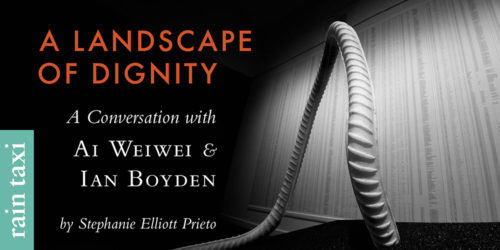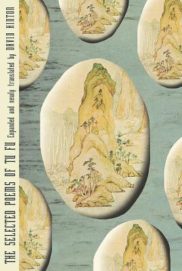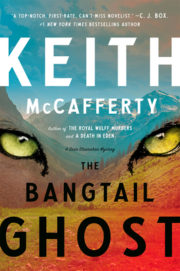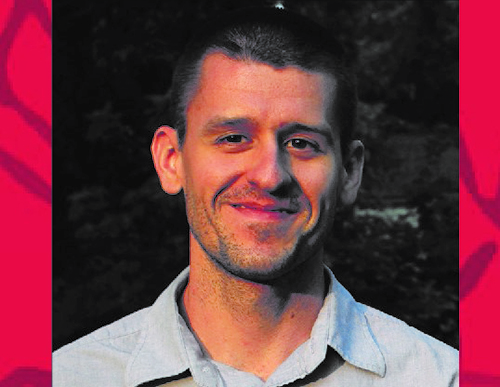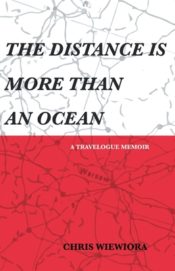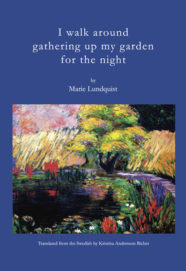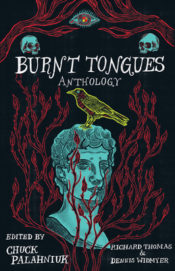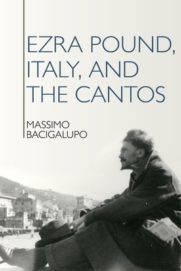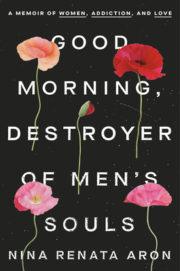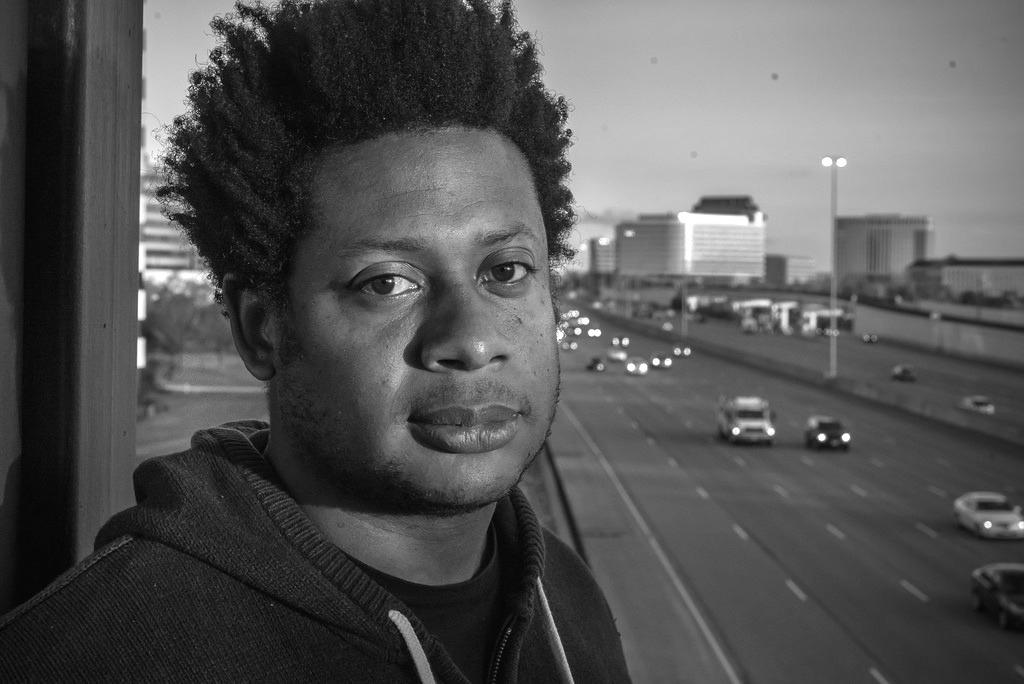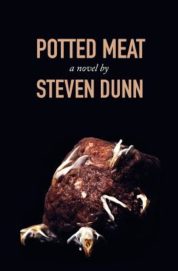by Stephanie Elliott Prieto
It is a tradition for intellectuals to speak out against power. This is why artists and poets are so valued by society.
—Ai Weiwei
In 2015, the artist, writer, and curator Ian Boyden contacted renowned artist Ai Weiwei about exhibiting Ai’s work at the San Juan Island Museum in Washington state. The resulting 2016 exhibition, Ai Weiwei: Fault Line (a virtual tour of which can be seen here), presented three pieces from his ongoing investigation into the 2008 Wenchuan earthquake—a magnitude 8.0 quake that killed over 60,000 people, including 5,196 schoolchildren, in Sichuan province, China. Boyden hoped that among other things, the exhibition would raise awareness about the lack of preparation for a major earthquake in the Pacific Northwest. In the case of the 2008 Chinese earthquake, the destroyed schools had been built under government contract, quickly and cheaply, ignoring the government’s own building codes; the title “Fault Line” was thus a double entendre, referring to both the geological feature and the corruption that caused political leaders to fail to protect citizens. In China, the massive death toll was covered up by the government; even parents of the dead were intimidated into silence.
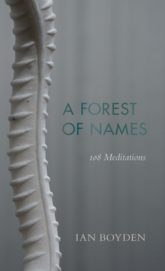 Working on the exhibition had a profound effect on Boyden, and out of it was born a body of poems. An entire wall of the exhibition was a monumental piece titled “Names of the Student Earthquake Victims Found by the Citizens’ Investigation”—and indeed, it listed the names of all the schoolchildren who died. As Boyden installed this wall, he began translating the meanings of the children’s names and sharing them on Twitter, but he found the names often defied a single translation, so he began to render them as short poems. Boyden spent a year translating the names and writing poems, and the result is now published as A Forest of Names: 108 Meditations (Wesleyan University Press, $15.95). The collection of spare poems meditates on language, translation, societal responsibility, and human dignity. It calls us to reflect on the faith we put in our governments and the immense power the state holds over our fragile human lives.
Working on the exhibition had a profound effect on Boyden, and out of it was born a body of poems. An entire wall of the exhibition was a monumental piece titled “Names of the Student Earthquake Victims Found by the Citizens’ Investigation”—and indeed, it listed the names of all the schoolchildren who died. As Boyden installed this wall, he began translating the meanings of the children’s names and sharing them on Twitter, but he found the names often defied a single translation, so he began to render them as short poems. Boyden spent a year translating the names and writing poems, and the result is now published as A Forest of Names: 108 Meditations (Wesleyan University Press, $15.95). The collection of spare poems meditates on language, translation, societal responsibility, and human dignity. It calls us to reflect on the faith we put in our governments and the immense power the state holds over our fragile human lives.
As Boyden’s book is the result of his long-term engagement with the work and thought of Ai Weiwei, I was privileged to correspond with both of these creators to discuss this project, cross-cultural artistic collaboration, and why “poetry is a dangerous act.”
EDITOR’S NOTE: Ai Weiwei’s responses were translated from Chinese by Ian Boyden. Stephanie Prieto is the publicist at Wesleyan University Press and serves on the Association of University Presses Committee for Equity, Justice, and Inclusion.
Stephanie Prieto: Do you think poetry and art play a role in understanding and upholding human dignity? If so, how do you view this role?
Ai Weiwei: Art and poetry are the most exceptional manifestations of all human emotional and cognitive activities. They cannot be replaced by rationality, science, or anything else. In today’s society, the spirit of art and poetry exists, but the modality of language has shifted. Every day, I witness ordinary people on Twitter expressing poetry unconsciously. Art is actually ubiquitous within reality, it is simply that this art is not necessarily made by artists from the academy. Regardless of whether it is poetry or art, both are important standards by which we can measure the spiritual quality of humanity.
Ian Boyden: I love this observation that the modality of language has shifted. This shift has allowed us to see and express ourselves in novel ways. When I first started this project, I was writing these poems on Twitter as a conversation with . . . well, mostly with myself. I felt like a firefly pulsing light in the darkness. Every day a few names would pulse from Weiwei’s account, and I would then pulse a poem in return. It was the conditions of Twitter that gave these poems the shape and rhythm they have. The 140-character limit required concision. But slowly, as the project grew and the novelty of the modality wore off, I began to understand that what I was wrestling with was something very ancient and central to what it means to be human: dignity. How do we describe dignity, how do we nurture it, protect it? In the names of these children, I saw dignity take the form of a vast landscape that is a profound expression of our shared world.
林萤
Forest of FirefliesFor a lifetime we pulsed
messages of light into the void, and waited,until we understood our message
was also our answer.
SP: Do you think the poems from A Forest of Names will find their way to Chinese readers? How do you think the work would be received?
AW: First of all, poetry itself is an intermediary, it’s a soliloquy, the poet thinking out loud to themself and in their own language. Poetry is a means to come face to face with language, history, and emotion, and as such it is a very personalized expression. If one writes poetry only to find readers, then poetry loses its most important layer of meaning. I don’t want to say Ian’s poems are unlikely to have many readers in China, but even a person who writes in Chinese in China doesn’t have many readers. Today, society is growing farther and farther away from poetry. The subject that Ian has addressed is considered politically sensitive. In addition, it’s related to part of my work and I myself am politically sensitive, which means my work is subject to censorship. You could say, the possibility of his poetry being openly circulated in China is zero. However, despite this, there is a literary magazine in China called Survivor, which is an underground publication. Some of Ian’s poems were published in this magazine, and so there are a few people in those circles who are aware of the existence of these poems.
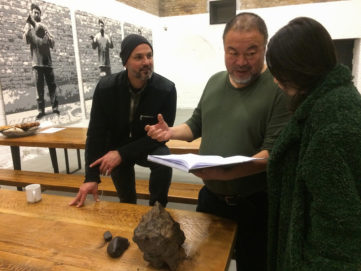
Ian Boyden and Ai Weiwei reviewing an early draft of A Forest of Names at Ai Weiwei’s studio in Berlin, December 2017. Photograph by Zhipeng Liang.
SP: Ian, did you ever consider how Chinese readers might receive your work? Even if you didn’t necessarily think that would be a reality, did it affect your writing?
IB: How to translate these children’s names was, and continues to be, the subject of conversation with Chinese friends. They have been overwhelmingly supportive of this work, not just because the poems address an enormous humanitarian tragedy, the poems appeal to something very ancient and treasured at the very heart of Chinese linguistic reality—the primacy of names. At the center of Confucian philosophy is what is known as the “Rectification of Names”; for social harmony to exist, names must point to a specific truth. A is A; B is B. And yet, the opening line of the Tao Te Ching reads: The name that can be named is not the eternal name. Thus, the fabric of language must refer to truth, a truth that is the foundation of a healthy body politic, and, at the same time, names must transcend their own limits to embrace that eternal mystery that is each individual being. A power of poetry is that it both names and triangulates what exists beyond articulation.
And this leads to another subject at the heart of this project: How do we identify ourselves? How does identity relate to language? How does identity relate to memory? How does the relationship of the individual to the state affect our identity? Names are the very first forms of identity we are given, and in the case of these children, they are virtually all that remains. What happens to our identity when the state actively censors the names of the dead? What happens when it censors the grieving process? What happens to our identity when the state weaponizes the legal system, weaponizes language? What happens when the state actively creates false reality for its own end? To censor these names is to go to war with truth and dignity.
SP: Could you comment on the potential afforded by cross-cultural artistic practice in exchange, and how this is threatening to larger political bodies/states?
IB: A critical component of that potential is translation. Translation is the primary process by which a structure of thought born in one language can enter another. By its nature, this practice is disruptive, even subversive. Maybe not when we are trying to order a plate of food, but when it comes to a poem or a novel, or, say, trying to make sense of a monumental philosophy like Buddhism or Marxism, the effect can be overwhelming, reweaving the entire linguistic fabric. When language shifts in structure, it shifts what we are capable of perceiving, it shifts who we are capable of being, and thus upsets the balance of power.
AW: I think poetry is a dangerous act. In this regard, it’s just like art. Its potential and subversiveness are formidable, but first it must be allowed to exist. If systems of dissemination and/or censorship forbid its existence, then its subversiveness will disappear. This is why, with regard to art and literature, the establishment of fundamental human worth and freedom is the first requirement. I believe that in an open society this kind of discussion can exist, even if it may be trivial. People are entangled by various forms of popular discourse.
萬容
Myriad ContainerThe urn shattered,
ten thousand questions scattered
in the stone dust.
But each in its own way asked,Are we still one?
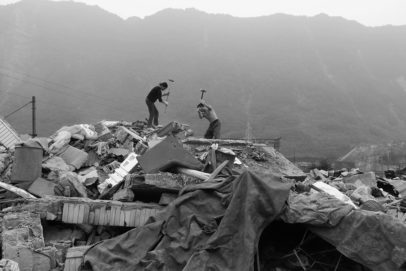
Beichuan County, Sichuan, May 2008. Photograph by Ai Weiwei. Image courtesy of Ai Weiwei Studios.
SP: What does it mean to you, to have an American author publish a book in response to your invitation to consider the names of the children killed in the Sichuan earthquake of 2008?
AW: What Ian has done is an exceedingly isolated and very poetic act. It is as if he suddenly discovered a pearl in the middle of a desert. Looking into this pearl, he sees clearly the universal value of human life and of our humanity. And yet in today’s world to hold these values has become a rare thing. It is very rare to find a person who sincerely cares about the suffering of other people, other ethnicities; to turn this kind of concern into poetic experience is even rarer still.
SP: Ian, how do you feel? Did you have any reservations, as an American responding to this horrific tragedy that happened to a nation that is often considered an adversary of the United States? Particularly a tragedy that is so politically sensitive?
IB: This question defies a simple answer. First, I would stress that I did not respond to this tragedy as an American but as a human. It was a tragedy that fell upon individuals and communities, first as buildings collapsed and then again as their government responded in such a horrific way.
There is a curious event horizon surrounding China, a pervasive illusion that what happens within its borders somehow bears no effect upon the outside world and vice-versa. It’s as if all the laws of causation and the dynamics of responsibility were somehow suspended. The cultural genocide of Tibetans and Uighurs—are those “politically sensitive” events truly internal affairs? An affront to one person’s fundamental rights, no matter where or who they are, affects us all. I responded to this tragedy as another human.
“Politically sensitive” is a way of acknowledging that fundamental rights are being violated. Taboo is the tool of the oppressor. The PRC has waged an all-out assault on language since the 1950s—destroying the plurality of languages across the country, severing linguistic continuity with the past by changing how the language is written, developing a vast system of censorship, constantly employing doublespeak, dictating what can and cannot be said, controlling the flow of information at all levels. Political language is used to undermine reality in the service of the few. Freedom of speech is not recognized as a fundamental right. Now, perhaps more than any time in history, the names need to be rectified.
SP: You have said of A Forest of Names: “I see this work as conceptual as can be. It is a beautiful and persistent effort of a poet’s heart and mind working together, dealing with our tragic reality.” In addition to considering the importance of the message in a piece of writing or other artwork, could you comment on the importance the method of approach, or aesthetics, in creating a piece of artwork?
AW: The nature of a work of art is determined by its feeling, its understanding, how it spreads through its creative use of language. If it abandons any of these fundamental levels, it cannot possess implicit meaning. Although artistic or literary acts are quite rare, they are an important part of the innate character of human beings. That such things appear or come into being, is, by itself, already an exquisite circumstance. The difficulty in this day then becomes how to disseminate this work of art or poem more widely. However, I stress that its coming into being is important in and of itself. This is important because it proves that people are beings that possess spirituality and compassion. It proves the possibility of a dialogue with an imagined world, an imaginary world that actually exists parallel with our own.
IB: The Chinese term Weiwei used here, translated as “implicit meaning,” is 含意, pronounced hányì. This is a very important aesthetic term in Chinese poetry. It literally means a meaning held in the mouth, unspoken and thus withheld from language. How to say something without saying it? This might be because it is too dangerous to say something directly. But it also speaks to a truth about language itself. One of the great ironies of language is that it often imprisons, or limits, the very idea one wishes to express. In Chinese poetry, there is a deep appreciation for generating conditions where meaning itself is granted freedom. So, we can see dignity is at play in this type of method, and this symbiosis of the spoken and unspoken was certainly a quality I sought to engage in the writing of these poems.

Detail of the installation of “Names of the Student Earthquake Victims Found by the Citizens’ Investigation” (2008–2011) by Ai Weiwei. Photograph by Ian Boyden.
SP: Ian, I read that you taught yourself Chinese by reading Ai Weiwei’s father’s poetry. That seems like fate.
IB: When I was nineteen, I went to China as a foreign exchange student. Before I left, a mentor of mine, the late poet Tom Crawford (1939–2018), gave me a bilingual volume of Ai Qing’s collected poems to take with me. My Chinese teacher at Nanjing University was so surprised when I showed her this book. Ai Qing (1910–1996) had only recently been allowed to return to Beijing from twenty years of exile in a labor camp in Xinjiang—the camp where Ai Weiwei was raised. I was young and naïve; at the time, it never occurred to me that this poet had a family, that he had a son named Weiwei. I really loved Ai Qing’s poems from the early 1930s that are filled with raw and ardent rebelliousness. I studied those poems—they were kernels around which the rest of my Chinese grew. Language is not truly separate from the speaker. Just a few words, a few vibrations of sound, can shape the subsequent patterns and conditions of the rest of our lives. I think much of life is spent trying to make sense of that. Ai Qing has a poem that speaks to this mystery, and I offer my own translation of it here:
Trees
One tree, another tree—
each towering and motionless,
each standing alone from the others—
the wind and air
tell of their distance apart.But enshrouded within the earth,
the trees’ roots stretch out
through the invisible depths
where their finest tendrils braid together.
There’s a visible landscape we all see. And there exists an invisible landscape that not only grounds us but is also a conduit of mind. Perhaps those roots reaching out through the earth are an image of fate, inseparable from curiosity and determination, empathy and fundamental dignity.

